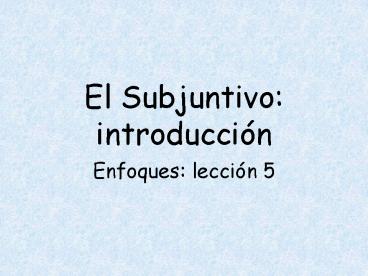El Subjuntivo: introducci PowerPoint PPT Presentation
Title: El Subjuntivo: introducci
1
El Subjuntivo introducción
- Enfoques lección 5
2
In Spanish, there are 2 moods INDICATIVE and
SUBJUNCTIVE
THEBIGPICTURE
3
INDICATIVE is the mood of all the verb tenses
youve ever learned
- present tense (example llevo)
- preterite tense (example llevé)
- imperfect tense (example llevaba)
- the perfect tenses (example he llevado,
-
había llevado) - future tense (example llevaré)
- conditional tense (example llevaría)
4
SUBJUNCTIVE is the other mood. It has several
uses, some of which are
- doubt or denial of an action
- speculation about a future action
- willing something to happen
- influencing an actions outcome
- expressing emotion about an action
- indicating a nonexistent or nonspecific item
5
WHICH USE DIDWE LEARN ABOUTIN THE SONG
YESTERDAY?
6
Que mis ojos se despiertenQue mi madre no se
muera y que mi padre me recuerdey quesea de
vosy que de tu voz sea este corazón
7
Thats right, willing something to happen. (in
this case asking God, may all of this happen)
8
ALMOST ALWAYS in order to use subjunctive, you
must have an expression that signals its use.
- Examples (traduzcan)
- Quiero que Ana baile conmigo.
- I want that Ana dance with me.
- Es dudoso que Juan trabaje en Kohls.
- It is doubtful that Juan works in Kohls.
- Siento que tú estés enferma.
- Im sorry that you are sick.
9
Common verbs of will and influence
- aconsejar to advise
- desear to desire
- exigir (j) to demand
- gustar to be pleasing
- hacer to do, make
- importar to matter
- insistir en to insist
- mandar to order
- necesitar to need
- oponerse a to oppose
- pedir (i) to ask for, request
- preferir (ie) to prefer
- prohibir to prohibit
- proponer to propose
- querer (ie) to want, wish
- recomendar (ie) to recommend
- rogar (ue) to beg, plead
- sugerir (ie) to suggest
10
verb signaling QUE verb in
subjunctive subjunctive
- Examples
- La maestra manda QUE hagamos la tarea.
- The teacher demands that we do the homework.
- Me gusta QUE tú llegues temprano.
- I like you to arrive early.
- A Dios le pido QUE haya mucha nieve mañana.
- I ask God that there be a lot of snow tomorrow.
11
Common verbs/expressions of emotion
- gustar to be pleasing
- molestar to bother
- sentir (ie) to be sorry
- sorprender to surprise
- temer to fear
- tener miedo de to be afraid
- alegrarse de to be happy
- es extraño its strange
- es ridículo its ridiculous
- es terrible its terrible
- es una pena its a pity
- esperar to hope, wish
12
verb signaling QUE verb in
subjunctive subjunctive
- Examples (traduzcan)
- Es una pena QUE no haya nevado nada.
- Its a pity that it hasnt snowed at all.
- Es ridículo QUE ellos coman pescado con
helado. - Its ridiculous that they eat fish with
ice-cream. - Me alegro de QUE haya pizza para la cena.
- Im glad that theres pizza for dinner.
13
Common verbs/expressions of doubt/denial
- es improbable its unlikely
- es poco seguro its uncertain
- es posible its possible
- no es posible its not possible
- es probable its likely
- no es probable its not likely
- dudar to doubt
- negar (ie) to deny
- no creer to not believe
- no es verdad its not true
- no estar seguro de to not be sure of
- es imposible its impossible
14
verb signaling QUE verb in
subjunctive subjunctive
- Examples (traduzcan)
- Es dudoso QUE vayan a correr 15 millas.
- Its doubtful that they are going to run 15
miles. - Es posible QUE haya una prueba mañana.
- Its possible that there is a quiz tomorrow.
- Niegas QUE sus notas sean malas.
- They deny that their grades are bad.
15
Now that you know when to use it, have you
figured out how to FORM subjunctive?
- To form present subjunctive
- Take the YO form of the present tense
- Drop the O
- Add the opposite ending (for AR -gt e ER,IR
-gta)
16
- Take the YO form of the present tense
- 2. Drop the O
- 3. Add the opposite ending (for AR -gt e
ER,IR -gta)
LLEV
AR
O
O
LLEV
E
LLEV
17
- Examples (try!)
- hablar
- hable
- comer
- coma
- morir
- muera
- ver
- vea
- pedir
- pida
- poner
- ponga
- decir
- diga
- hacer
- haga
- llegar
- llegue
- traer
- traiga
- llevar
- lleve
- poder
- pueda
18
What about verbs that dont end with o in the
YO form, like voy and sé?
There are 6 irregulars in subjunctive HAYA (haber
) VAYA (ir) SEA (ser) SEPA (saber) DÉ (dar) ESTÉ
(estar)
19
There is one small adjustment for the tú,
nosotros and ellos forms of subjunctive...
- Examples
- yo COMA yo LLEVE
- tú COMAS tú LLEVES
- él COMA él LLEVE
- nosotros COMAMOS nosotros LLEVEMOS
- ellos COMAN ellos LLEVEN
20
Whew! I know subjunctive is a littledaunting at
first, but you can do it...

